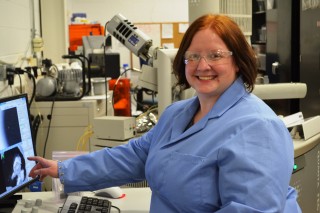Student Spotlight: Melissa Sweat
Congratulations to Melissa Sweat, a recent ALERT graduate student who completed her Ph.D. in Chemical Engineering at Purdue University last fall, and is now working as a Visiting Scientist with the Transportation Security Laboratory in New Jersey! Before graduating, Melissa worked with ALERT Thrust Leader, Prof. Stephen Beaudoin, at Purdue University. Her thesis, titled, “Compressive Behavior of Simulated Explosive-Filled Composites,” has two major emphases: evaluating the compressive behavior (or “squishiness”) of C-4, and creating a benign equivalent to C-4 – the end goals of which are to better remove explosive residues from surfaces. Because C-4 (a highly explosive compound) is difficult to obtain and dangerous to work with, Melissa created an inactive equivalent to C-4 that could be studied in the lab; she has recently submitted her work for publication to scientific journals such as Propellants, Explosives, Pyrotechnics and Power Technology.
Melissa has been doing research in chemical engineering since she was an undergraduate at Mississippi State University, but had not considered studying particles and explosives until she began her Ph.D. at Purdue and attended a presentation by her former advisor, Prof. Beaudoin. When describing what drew her to his research project, she states, “It’s a little naïve, perhaps, but everyone wants to change the world, right? This research gives me a chance to help make the world a safer place… You’ll never be bored working explosives trace detection, that’s certain! And if you come from a particles background? There are even more options for research!”
After completing her Ph.D. in the fall of 2015, Melissa accepted a position as a Visiting Scientist with the Transportation Security Laboratory (TSL), moved from West Lafayette, Indiana to Atlantic City, New Jersey, and is already settling in to life on the East Coast. Her new position will focus on explosive residue deposition and contact sampling. While she’s still nailing down the details of the work, she anticipates examining the impact of various deposition techniques – researching how residue deposits will be affected by dry transfer, live fingerprinting, or other techniques. The second phase of the project is expected to be adhesion driven, focusing on the amount of residue collected during a swipe test.
Melissa was first exposed to TSL through her project with ALERT, and was able to take advantage of multiple networking events, such as the ASPIRE (Annual Student Pipeline to Industry Roundtable Event), the TESSA (Trace Explosives Sampling for Security Applications) Workshop, and the TED (Trace Explosives Detection) Workshop, to learn more about potential career opportunities with the lab. When asked what advice she would pass along to students looking ahead to the job market, she recommends that they find opportunities to go to conferences and present their work. Also, when asked how her experience with ALERT impacted her interests and career, she reflects that, “ALERT really introduced me to a number of other facets important to explosives detection… It’s really helped me see the big picture with respect to explosives related threats.”


There are currently no comments.
The comments are closed.